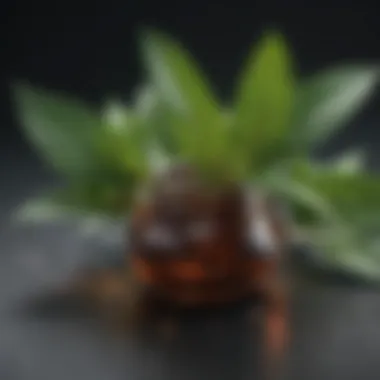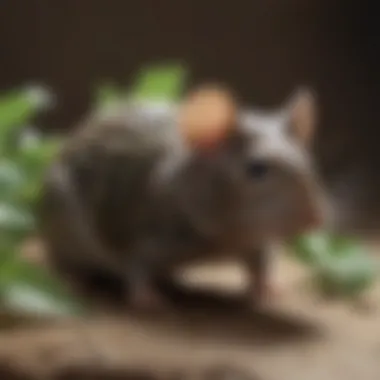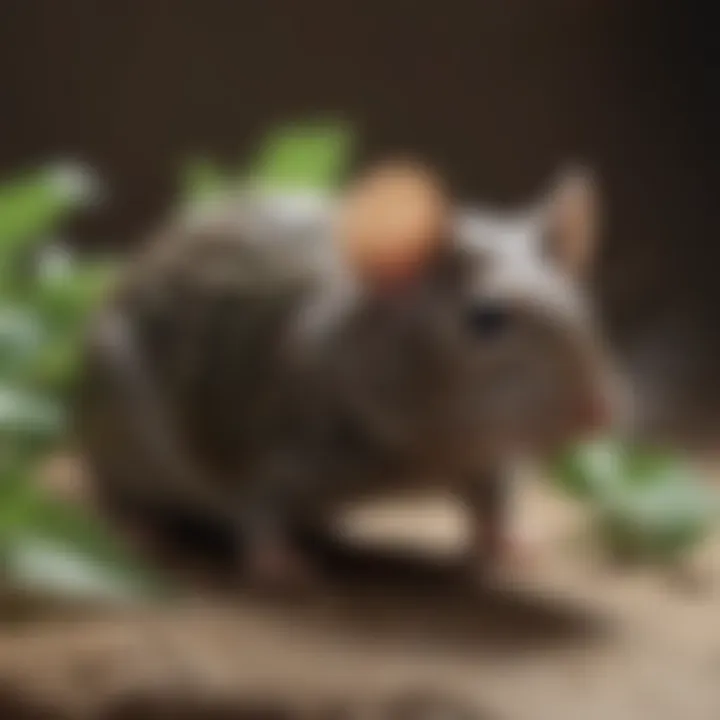Peppermint Oil in Rodent Management: A Natural Approach


Intro
The problem of rodent infestations is prevalent in many households. It poses not only a nuisance but also potential health risks. Solutions often range from chemical traps to exterminators, yet there is an increasing interest in more natural approaches. One such method is the use of peppermint oil. This article explores how peppermint oil can serve as an effective deterrent for rats while considering the science behind its effectiveness.
Understanding the Pest
Identification
Rats are often classified as rodents and belong to the family Muridae. The most commonly found species in urban areas is the Norway rat and the roof rat. Identifying these pests accurately is crucial for effective management. Norway rats are typically brown with a thick body, while roof rats are known for their slender frame and agility. Both species exhibit similar behaviors that include gnawing, nesting, and scavenging for food.
Rats have a keen sense of smell, which plays a significant role in their behavior and survival. This sensory ability is an essential factor in applying peppermint oil as a repellent agent since its scent can disrupt their olfactory orientation.
Life Cycle
Understanding the life cycle of rodents is essential to control methods. Rats reproduce quickly, with a female capable of producing multiple litters each year. The gestation period is about 21 to 23 days, resulting in a litter size ranging from six to twelve pups. These young become sexually mature within five weeks, leading to rapid population growth if not managed effectively. Thus, early identification and intervention are necessary to prevent extensive infestations.
Pest Prevention Strategies
Environment Modification
Altering the environment can significantly reduce the likelihood of rodent invasions. Here are some practical approaches:
- Seal Entry Points: Identify and close off gaps in walls, around doors, and windows.
- Remove Food Sources: Store food in airtight containers and clean up spills promptly.
- Manage Waste: Keep trash in sealed bins and dispose of waste regularly.
Physical Barriers
Implementing physical barriers provides a more direct way to block rodent access. Using materials like wire mesh or metal sheeting can block entry points most effectively. Additionally, monitoring areas around the home will allow homeowners to assess where barriers might be needed.
Control Methods
Chemical Control
Traditional pest control methods often involve chemicals. However, the toxicity and environmental impact of such substances raise concerns. Peppermint oil, in contrast, is a natural alternative that poses less risk. It contains menthol, which is known for its potent scent that repels rodents. It can be used in several ways:
- Diluted Sprays: Mixing peppermint oil with water in a spray bottle can create a repellent solution for areas where rats are present.
- Cotton Balls: Soaking cotton balls in peppermint oil and placing them in strategic locations can deter rats effectively.
Biological Control
Using natural predators or parasites to control rodent populations is known as biological control. This method is less common for managing rats but includes the introduction of natural predators, such as certain species of snakes or birds.
"Using peppermint oil as part of an integrated pest management approach can enhance a homeowner's overall rodent control strategy."
Prelude to Peppermint Oil and Rodent Control
Peppermint oil has gained traction as a natural solution for various household issues, particularly in the realm of pest management. Rats and mice present not only physical nuisances but also potential health risks. Thus, addressing rodent control effectively is of paramount importance to homeowners. The significance of peppermint oil in this context lies in its ability to deter these pests without the negative implications that often accompany chemical insecticides.
The application of peppermint oil offers both practical and environmental benefits. It is derived from the peppermint plant, presenting a non-toxic alternative to conventional pest repellents. This characteristic makes it particularly attractive to households with children or pets where safety is a concern. Understanding the nature of peppermint oil and how it interacts with rodent behavior is essential for homeowners seeking effective ways to manage pests in their living spaces.
Overview of Peppermint Oil
Peppermint oil, scientifically known as Mentha × piperita, is an essential oil extracted from the fragrant peppermint plant. Its primary components are menthol and menthone, which contribute to its strong scent and pest-repelling properties. This oil is renowned for its aromatic quality and potential health benefits, including ease of digestive issues and allergies. The concentrated nature of peppermint oil means that even small amounts can have a profound impact on rodent behavior. When used strategically, its aroma can effectively ward off rodents, making it a topic of interest for ecologically minded pest control.
The Rodent Problem
Rodents can become significant issues in homes, especially during colder months when they seek shelter. They reproduce rapidly, meaning a small infestation can grow into a larger problem in a short time. Common species, such as the roof rat and the Norway rat, are not just bothersome; they can cause damage to property and put food supplies at risk.
Understanding the rodent problem involves recognizing their habits and preferred environments. Rodents tend to thrive in places where they can easily access food and nesting materials. Thus, prevention and control measures must focus on both eliminating attracting conditions and employing deterrents like peppermint oil. Most importantly, addressing these issues early can prevent costly repairs and health risks associated with rodent infestations.
"Utilizing peppermint oil for rodent control not only protects your home but also supports an eco-friendly pest management strategy."
Understanding Peppermint Oil


Understanding peppermint oil is essential for grasping its role in rodent management. This knowledge not only highlights the oil's potential effectiveness against pests like rats but also guides users in its application. For many homeowners looking for natural methods, knowing how peppermint oil affects rodents is critical.
Chemical Composition
Peppermint oil contains various chemical compounds that contribute to its desired effects. The primary ingredient is menthol, which gives peppermint its characteristic scent. Other notable components include menthone, menthyl acetate, and pulegone. These compounds interact with the sensory receptors of rodents, causing irritation and evoking powerful aversive reactions. Such biological interactions make peppermint oil a candidate worth exploring in pest management strategies.
Additionally, the concentration of these compounds affects potency. Higher concentrations typically mean stronger deterrent properties. Therefore, understanding the specific chemical makeup of peppermint oil can inform its efficacy in targeting rodent populations while minimizing environmental impact. Research has shown that not all peppermint oils are created equal. Variations in extraction methods and plant sources can lead to differences in chemical composition, thus influencing effectiveness.
Properties of Peppermint Oil
The various properties of peppermint oil play a significant role in its application for rodent control. Firstly, it is known for its strong scent, which is highly appealing to humans but repulsive to rodents. This property makes it an excellent tool for repelling pests in a non-toxic manner.
Furthermore, peppermint oil has certain antimicrobial properties. It may help in sanitizing areas where rodents have left droppings or urine, thus presenting a health benefit beyond mere repulsion. Studies indicate it can deter rodents from entering spaces more effectively as compared to synthetic chemicals.
It is also important to consider the volatility of peppermint oil. As it evaporates quickly, its effectiveness can diminish over time, necessitating repeated applications. Understanding these properties enables homeowners and pest management professionals to devise strategic applications, ensuring the oil remains a relevant element in their pest control arsenal.
"Peppermint oil serves not just as a deterrent but also as a potential solution for cleaning contaminated areas, highlighting its multifaceted utility in rodent management."
In summary, a thorough understanding of peppermint oil—its chemical compositions and properties—equips users with the necessary insights to leverage it effectively against rodents.
Mechanisms Through Which Peppermint Oil Affects Rats
Understanding how peppermint oil interacts with rats sheds light on its potential as a pest control solution. This section delves into sensory reactions and behavioral changes in rodents when exposed to peppermint oil. These mechanisms are crucial for assessing the application's efficacy and optimizing its use.
Sensory Reactions of Rodents to Scents
Rats rely heavily on their sense of smell for navigation, food identification, and social interactions. When peppermint oil is introduced into their environment, it creates a powerful scent that can have various impacts.
- Olfactory Sensitivity: Rodents are more sensitive to certain scents. Peppermint oil, with its strong menthol aroma, can overwhelm their olfactory receptors. This leads to confusion and potentially avoidance behavior.
- Conditioned Aversion: Some studies suggest that repeated exposure to peppermint can develop a conditioned aversion. In simple terms, if a rat associates the peppermint scent with an unpleasant experience, it may learn to stay away from it altogether.
- Deterrent Properties: The intrinsic properties of peppermint oil can serve as a natural repellent. The scent can mask or distract from other more appealing smells, making it tricky for rats to locate food sources.
Behavioral Changes Induced by Peppermint Oil
The introduction of peppermint oil does not affect only the sensory perception of rats, but also leads to significant changes in their behavior. Recognizing these changes helps in understanding its application in pest management.
- Increased Anxiety: Exposure to peppermint oil can elevate anxiety levels in rodents. This is evident as they exhibit restless behavior, reduced activity, and increased hiding. Such responses may make them less likely to explore areas treated with peppermint oil.
- Altered Feeding Habits: Research indicates that peppermint oil can deter rats from feeding in treated areas. They may choose to eat less in the presence of the scent, striving to avoid areas that have significant peppermint oil presence.
- Exploratory Behavior: Rodents typically exhibit exploratory behavior in their search for food and mates. However, the presence of peppermint oil alters this behavior significantly. Rats may become hesitant to venture into spaces where the scent is prominent.
"Peppermint oil serves not only as a deterrent through sensory overload but also by inducing behavioral changes that enhance avoidance."
In summary, understanding how peppermint oil affects rats at both sensory and behavioral levels is integral to its effective use in rodent management. Through these mechanisms, it is possible to leverage peppermint oil as a natural solution, especially in environments where traditional methods might pose risks.
Efficacy of Peppermint Oil in Pest Control
The importance of the efficacy of peppermint oil in pest control cannot be overstated. This section will analyze how effective peppermint oil is as a natural rodent deterrent compared to more conventional methods. This aspect plays a critical role in understanding whether peppermint oil can be a feasible alternative, especially for homeowners who prefer eco-friendly solutions.
Peppermint oil's effectiveness hinges on its ability to repel rodents. Study findings suggest that certain compounds in peppermint oil trigger responses in rodents that lead them to avoid treated areas. The oil's strong aroma disrupts the sensory pathways of rats, making them feel uncomfortable in environments where peppermint oil is present.
Moreover, the use of peppermint oil aligns with growing concerns about the health of the environment. Homeowners often seek solutions that are not only effective but also less harmful to pets and children.
"Utilizing natural substances like peppermint oil opens doors to safer pest management options for residential and commercial contexts."
Studies and Research Findings
Research into the effectiveness of peppermint oil in rodent management has shown promising results. In various controlled experiments, peppermint oil has demonstrated its ability to significantly deter rats from entering specific spaces where the oil is applied. Studies conducted at universities and research institutions revealed that the presence of peppermint oil reduced rodent activity by a notable percentage.
One study published in a journal highlighted that peppermint oil, when applied adequately, effectively reduced rodent populations in confined environments. Researchers noted a 60 to 90 percent decrease in rat sightings within two weeks of oil application. This suggests that peppermint oil can provide a timely response to infestations when utilized correctly.
However, it’s worth noting that while these findings are encouraging, they do not suggest total eradication. Rather, peppermint oil should be seen as a deterrent that can complement other pest management approaches.
Comparison with Traditional Methods
When comparing peppermint oil to traditional pest control methods, the contrast is striking. Traditional methods often involve the use of chemical poisons and traps, which can be toxic to non-target animals and pose risks to human health. Peppermint oil presents a non-toxic alternative that many homeowners can feel at ease using in their spaces.


- Advantages of Peppermint Oil:
- Disadvantages Compared to Traditional Methods:
- Non-toxic to pets and humans
- Eco-friendly and sustainable
- Pleasant aroma compared to chemical pesticides
- May require more frequent application
- Not as instantly effective as traps or poisons
While traditional methods may promise quick results, they are fraught with potential hazards. Peppermint oil offers a viable solution for homeowners looking for a safer approach to pest management. Integrating peppermint oil into a comprehensive pest control strategy, alongside other methods, can provide balance and effectiveness in managing rodent populations.
Applications of Peppermint Oil for Rats
Techniques for Application
Proper application of peppermint oil plays a crucial role in determining its effectiveness against rats. Here are some common techniques homeowners can implement:
- Soaking Cotton Balls: One straightforward method is to soak cotton balls in peppermint oil. Place these cotton balls in areas where rat activity is evident, such as near entry points, in attics, and around foundations. Refresh the cotton balls regularly to maintain their scent strength.
- Spray Solutions: Mixing several drops of peppermint oil with water in a spray bottle creates an effective repellent. This solution can be sprayed in potential nesting areas, like behind appliances, in cabinets, or along baseboards. Shake well before application to ensure even distribution.
- Essential Oil Diffusers: Using an essential oil diffuser can also disperse peppermint oil into the air. This method is especially effective in enclosed spaces. It releases a continuous aroma that may deter rats from entering those areas.
- Homemade Peppermint Oil Traps: Combine peppermint oil with other ingredients, such as vinegar or dish soap. This mixture can be placed in containers where rat activity is suspected. One could also use this to create barriers, enhancing the overall effectiveness of the peppermint oil.
Engaging in these methods might yield a noticeable difference in rodent behavior over time. It is important to maintain these applications to ward off new infestations.
Formulations and Concentrations
The formulation and concentration of peppermint oil used for pest control are vital to its success. Here are some considerations:
- Concentration Levels: Most studies suggest that a dilution of 10% to 20% peppermint oil is effective for repelling rats. This means mixing around 10 to 20 mL of peppermint oil with 90 to 80 mL of water or carrier oil.
- Quality of Essential Oil: The quality of peppermint oil matters significantly. Therapeutic-grade oils often provide better results since they contain higher levels of menthol and other active compounds that rats find repugnant.
- Storing and Handling: Proper storage of peppermint oil is essential for maintaining its potency. It should be kept in a cool, dark place in a tightly sealed container to avoid degradation.
Integrating peppermint oil into rodent management strategies provides numerous benefits. It encourages an eco-conscious mindset in pest control, offering effective alternatives to chemicals that can harm both humans and the environment. By understanding the techniques for application and the importance of formulations, homeowners can better protect their living spaces from unwanted pests.
Benefits of Using Peppermint Oil
Peppermint oil presents multiple advantages in managing rodent populations. Its integration into pest control strategies resonates with a growing desire for natural and effective solutions. This section delves into the significance of utilizing peppermint oil not only as a repellent but also as a cornerstone of a broader rodent management strategy. Focus will be on eco-friendly features, non-toxic characteristics, and the inherent safety of peppermint oil as an option for households.
Eco-Friendly Characteristics
The environmental benefits of peppermint oil are considerable. As concerns about chemical pesticides rise, peppermint oil stands out for its renewable, plant-based nature. Its extraction derives from the peppermint plant, typically engaging in sustainable practices that reduce the ecological footprint.
- Biodegradability: Peppermint oil decomposes naturally, minimizing long-term ecological disruption. In contrast, synthetic chemicals may linger in the environment, posing risks to wildlife and water supplies.
- Non-Persistent: The absence of chemical residues means that peppermint oil does not accumulate in the environment. Thus, it offers a solution for those who prioritize maintaining biodiversity and ecosystem balance.
- Sustainable Production: The cultivation of peppermint can contribute to local economies without extensive use of harmful fertilizers or pesticides.
Households opting for peppermint oil not only mitigate rodent issues but also align their pest management practices with sustainable principles. This ecological approach appeals to environmentally conscious homeowners.
Non-Toxic Nature and Safety
Safety is paramount in pest control choices, especially for families with children and pets. The non-toxic nature of peppermint oil enhances its attractiveness as a rodent deterrent. Unlike conventional substances, peppermint oil poses minimal health risks.
- Safe Exposure Levels: When used properly, peppermint oil remains safe for both indoor and outdoor applications. Simple precautions, such as using diluted forms, ensure a balance between efficacy and safety.
- Avoiding Chemical Exposure: Traditional rodenticides can expose inhabitants to toxins. Peppermint oil allows families to manage rodent issues while reducing exposure to harmful chemicals that may cause adverse health effects.
- Allergen-Friendly Properties: Most individuals are unlikely to have allergic reactions to peppermint oil, offering a broader safety net compared to more hazardous alternatives.
"The use of peppermint oil for rodent management represents a shift towards healthier household practices, combining effectiveness with safety."
By prioritizing the use of peppermint oil, homeowners can address rodent problems without compromising their health or the environment. This strategic choice exemplifies modern pest management philosophies centered on well-being and ecological responsibility.
Challenges and Limitations
The discussion around peppermint oil as a pest deterrent inevitably leads to understanding its challenges and limitations. While peppermint oil offers a natural alternative to traditional pest control methods, various factors can affect its effectiveness. Recognizing these challenges is crucial for homeowners and housewives aiming to implement this approach effectively.
Effectiveness Over Time
Effectiveness over time is a significant consideration when using peppermint oil to manage rodent populations. Over time, the potency of the oil may diminish, which could reduce its efficacy as a deterrent. Environmental factors also influence this. High humidity and temperature changes can impact the oil's concentration in the air and on surfaces where it is applied.
To maintain its effectiveness, it is advisable to reapply peppermint oil regularly. Many users recommend a monthly application during high activity seasons, such as fall and winter, when rodents are more likely to seek shelter indoors. Noting these timelines aids in keeping rodents at bay without relying solely on harsh chemicals.
Potential for Resistance
The potential for resistance is another aspect that needs attention. Just like with any pest control method, rodents may develop a tolerance to peppermint oil over time. If their exposure to the scent becomes frequent enough, they might start to ignore it, undermining its effectiveness. This eventuality suggests that while peppermint oil can be a part of an integrated pest management system, it should not be the only strategy employed.


To counteract the risk of resistance, using peppermint oil in conjunction with other complementary methods can prove beneficial. For instance, combining it with physical barriers or traps can create a more comprehensive approach. Varying the usage of peppermint oil and integrating it with other pest management techniques is essential to maintain its deterrent capabilities.
In summary, while peppermint oil holds promise for rodent control, understanding its limitations regarding longevity and potential resistance can lead to more effective pest management strategies.
Integrating Peppermint Oil into Pest Management Strategies
Integrating peppermint oil into pest management strategies is significant as it brings a multi-faceted approach to controlling rodent populations. This method prioritizes the use of natural deterrents while augmenting traditional techniques, which is essential for effective long-term management. One of the main advantages of utilizing peppermint oil is its eco-friendly nature. Unlike synthetic pesticides, peppermint oil poses less risk to human health and beneficial species in the ecosystem.
By combining peppermint oil with other pest management techniques, homeowners can create a more comprehensive system that enhances effectiveness. This integration can also lead to a reduction in reliance on chemical pesticides, thus promoting a healthier living environment.
Complementary Methods
When implementing peppermint oil in pest management, it is crucial to use complementary methods. Here are a few to consider:
- Traps: Setting traditional traps in areas where peppermint oil is applied can improve results. The oil acts as a deterrent, leading rodents into the traps more effectively.
- Cleanliness: Maintaining a clean environment by reducing food sources is another vital method. Peppermint oil can complement this by masking food odors that attract rodents.
- Ultrasonic Devices: These devices emit sounds that are unpleasant to rodents. Combining these with peppermint oil can further discourage rodent activity.
Overall, using peppermint oil alongside these methods increases the likelihood of successful rodent control.
Creating a Pest Management Plan
Creating a pest management plan that incorporates peppermint oil requires careful consideration of various factors. Homeowners should start by assessing the scale of their rodent problem. A detailed inspection can help identify infestation areas and determine the best points for peppermint oil application. A plan should include the following steps:
- Identify Entry Points: Locate areas where rodents may enter the home and apply peppermint oil nearby to deter them.
- Select Applications: Choose how to apply peppermint oil. This could be through cotton balls soaked in oil or using a spray bottle for larger areas.
- Monitor Effectiveness: Regularly check the areas treated with peppermint oil and adjust as needed. Observations will help refine future approaches.
- Habitual Maintenance: Incorporate peppermint oil applications into a regular cleaning and maintenance schedule. Doing so reinforces its effectiveness over time.
Case Studies and Practical Examples
The use of peppermint oil in rodent management has gained traction among homeowners and pest control professionals alike. Understanding practical applications through case studies enhances the comprehension of its effectiveness. By examining specific examples, one can see not only how peppermint oil can serve as a deterrent but also how it fits into broader pest management strategies.
The value of case studies extends beyond mere observational insights. They demonstrate real-world applications, underscore the versatility of peppermint oil, and illustrate actionable strategies. Any successful pest management program should leverage evidence of efficacy and apply learned principles to unique circumstances. Through the lens of case studies, effectiveness can be evaluated systematically, providing both homeowners and professionals with a roadmap to implement these strategies effectively.
Residential Applications
Homeowners frequently encounter challenges with rodents invading their spaces. A case study conducted in a suburban environment illustrated how peppermint oil can be integrated into household pest management. In this example, a homeowner utilized peppermint oil by soaking cotton balls in the oil and placing them in critical areas, such as entry points and suspected nesting locations.
The results were notable. Within a few days, the homeowner reported a significant decrease in rodent activity. The strong scent discouraged rodents from entering, as they are sensitive to smells. This simple yet effective application showcases how households can employ natural solutions like peppermint oil to mitigate pest problems without relying solely on chemical traps or poisons.
Benefits observed in this study included:
- Reduction in rodent sightings
- Minimal impact on household environment
- Affordability of peppermint oil compared to traditional methods
By emphasizing easy application methods, homeowners can feel empowered to tackle rodent issues while maintaining a safe home environment.
Commercial and Agricultural Contexts
In commercial settings, the application of peppermint oil also shows promise. A case study from an agricultural setting revealed how peppermint oil was used in a greenhouse to deter rodent infestation. Here, plant health is critical, and the presence of rodents poses a significant threat. The greenhouse management team integrated peppermint oil into their pest management strategy by using a diluted spray around greenhouse perimeters.
The outcome was encouraging. The study noted a stark decrease in rodent-related damage to plants, which is vital for both financial and operational aspects of farming.
Key outcomes included:
- Increase in crop yield due to reduced infestations
- Enhanced pest management system by incorporating natural deterrents
- Positive feedback from workers regarding the pleasant smell compared to chemical alternatives
These case studies highlight practical examples where peppermint oil's application not only aids in rodent management but also aligns with the growing trend toward sustainable practices. Whether in residential spaces or agricultural settings, its versatility emphasizes the importance of integrating peppermint oil into comprehensive pest management plans.
Epilogue and Future Directions
Summary of Key Insights
The research has shown that peppermint oil possesses unique properties that make it a potent deterrent against rats. The primary takeaways from this article include:
- Chemical Properties: Peppermint oil is composed mainly of menthol and menthone. These compounds contribute to its efficacy in repelling rodents due to their strong scent.
- Behavioral Mechanisms: Rodents exhibit marked aversion to the scent of peppermint oil. This behavioral response is linked to their evolved sensory reactions to strong smells, which they perceive as a threat.
- Efficacy Compared to Traditional Methods: Studies indicate that while peppermint oil may not fully eliminate rodent populations, it effectively reduces their presence when used consistently. This reinforces its role as a supplementary method in rodent management.
- Safety and Eco-Friendliness: The non-toxic nature of peppermint oil presents a significant advantage, especially in household settings where children and pets are present.
- Challenges to Consider: While peppermint oil is beneficial, limitations such as effectiveness over time and potential resistance from rodent populations warrant careful consideration when implementing its use.
Research Gaps and Areas for Further Study
Despite the insights gained from current research, there are still several gaps that necessitate further investigation:
- Long-Term Effectiveness: More studies are needed to determine the long-term sustainability of peppermint oil as a rodent deterrent. Understanding how its effectiveness may diminish over time is critical for practical application.
- Resistance Studies: Investigating the potential for resistance among rodents to peppermint oil is crucial. If rodents adapt, this could challenge its role in integrated pest management.
- Concentration and Formulation Effects: Future studies could explore the impact of different concentrations and formulations of peppermint oil on effectiveness, including potential synergy when combined with other natural deterrents.
- Comparative Field Studies: Practical field studies comparing peppermint oil against more conventional pest control measures can yield valuable data, aiding in better understanding its efficacy in various environments.







